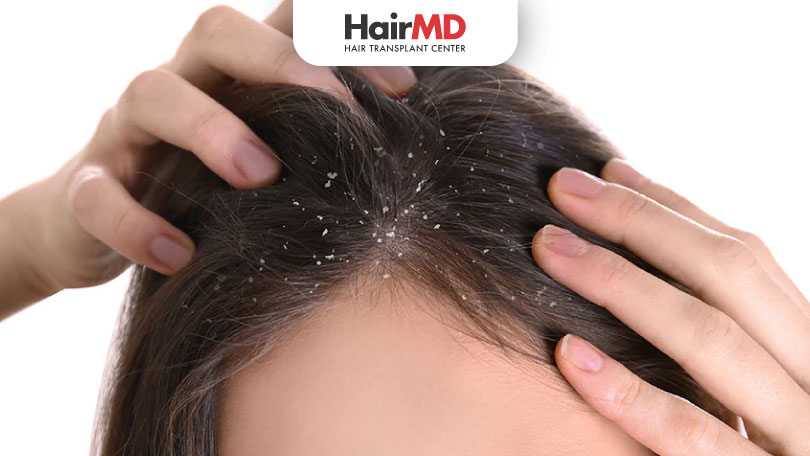
The dry and cold weather causes the scalp’s skin to lose moisture. This leads to cracked skin, causing the dead skin cells to come out in the form of flakes. Here we give you the reasons why dandruff increases in winter.
What’s covered in the article?
- Why Dandruff Increases in Winter
- Remedies for Dandruff in Winter
- Dandruff Treatment
- Conclusion
Why Dandruff Increases in Winter
During winter, many people notice their dandruff gets worse. This happens because cold weather and indoor heating dry out your scalp, leading to more flakes and irritation.
Here’s how different winter habits and conditions affect your scalp:
Dry Scalp Triggers More Oil: When your scalp gets dry, your body produces extra oil to make up for the dryness. This extra oil can mix with dead skin and lead to dandruff.
Woolen Caps Trap Heat: Wearing woolen caps or scarves increases your scalp’s temperature, creating a warm environment where dandruff-causing germs grow faster.
Less Hair Washing: In winter, you may wash your hair less often. This allows dirt, oil, and microbes to build up, making dandruff worse.
Hot Showers Followed by Cold Air: Washing your hair with hot water and then stepping out in the cold can confuse your scalp’s oil balance, leading to dryness and flaking.
Not Drinking Enough Water: Cold weather often makes us drink less water. Dehydration dries out your scalp, which can lead to dandruff.
Heat Styling Tools: Using hair dryers, straighteners, or curling irons often during winter dries out the scalp further, contributing to dandruff.
Indoor Heating: Spending time in heated indoor spaces dries out the air and your scalp, increasing the chances of dandruff.
What You Can Do:
-
Wash your hair regularly with a mild, anti-dandruff shampoo.
-
Use lukewarm water instead of hot water to wash your hair.
-
Drink enough water throughout the day to keep your body and scalp hydrated.
-
Limit heat styling tools and use a heat protectant if needed.
-
Apply nourishing oils like coconut or argan oil to maintain moisture.
-
If dandruff persists, consult a dermatologist for targeted treatment.
Remedies for Dandruff in Winter
An oil massage to the hair and scalp improves hydration, helps the skin retain moisture, and prevents dryness of the scalp, thus serving as an effective remedy for dandruff.
Salicylic acid is helpful in getting rid of scaly and flaky skin. Using a shampoo with salicylic acid as an ingredient is remedial against dandruff in winter.
Using an anti-dandruff shampoo helps in treating dandruff in winter.
It is best to keep your scalp moisturized, in order to prevent dryness. This can be remedial against dandruff caused by dryness of the scalp skin in winter.
Hot water causes the scalp to get dry and flaky. So avoid using hot water for washing your hair in winter.
Reduce stress levels, as stress is an important cause of dandruff and other hair problems.
Follow a healthy diet, and a good workout regimen, and adopt a proper hair care routine to keep dandruff at bay, during the winters.
Dandruff Treatment
Mild dandruff can be treated using a gentle shampoo to reduce the build-up of oil and skin cells.
Shampoo less during the winter and always use a conditioner following a hair wash. This is more applicable to people with dry hair.
Medicated and non-medicated hair products in the form of gels, oils, sprays, foams, and creams act as effective treatments against dandruff in winter.
A dandruff shampoo that contains one or more the ingredients like selenium sulfide, pyrithione zinc, salicylic acid, and ketoconazole is a good treatment for dandruff.
Tar-based shampoos have antibiotic and antifungal properties, owing to which, they help in treating dandruff.
Do You Know?
Nearly 250 Patients Visit HairMD
Everyday For Various Hair Concerns?
(Your journey to healthier and fuller hair starts here!)
Meet Our Dermatologists
Conclusion
Dandruff can worsen during winter due to dry, cold conditions and other factors like reduced hydration and scalp oil imbalances. To manage it effectively, it’s essential to adopt a proper hair care routine, including using anti-dandruff shampoos, keeping the scalp moisturized, and avoiding hot water. For persistent dandruff, consulting a dermatologist is advisable to explore medicated treatments. By following these tips, you can help control dandruff and maintain healthy hair throughout the winter season.
This was an overview of why dandruff increases in winter and dandruff in winter remedies and treatments. To get the correct answer to questions like ‘how to cure dandruff permanently’, ‘what is the most effective dandruff treatment’, or ‘what are the best remedies for dandruff in winter’, you should consult a dermatologist. If you are having dandruff or any other hair condition, one of the best places to approach is HairMD in order to get its correct diagnosis and treatment. HairMD is a reputed hair transplant centre in Pune and has a team of experienced dermatologists in Pune who specialize in treating hair conditions. They will guide you well on the best dandruff treatments and home remedies, and help you cure dandruff permanently and achieve healthy and beautiful hair.
Further Reading
Redensyl vs Minoxidil: Which is the Better For Hair Growth?
Confused between Redensyl and Minoxidil? Discover which treatment works best for hair growth and how to choose the right one for you.
QR678 for Hair is Better than GFC? An Honest Opinion by a Board-Certified Hair Dermatologist
IV drip for hair growth delivers essential vitamins directly into the bloodstream to reduce hair fall and improve hair quality. Doctor-guided treatment.
7 Benefits of IV Drip Therapy for Healthy Hair
Discover how IV drip therapy nourishes hair follicles, reduces hair fall, and improves hair growth. The doctor explained the benefits.
IV Drip for Hair Cost in Pune | HairMD Doctor Guide
IV drip for hair growth delivers essential vitamins directly into the bloodstream to reduce hair fall and improve hair quality. Doctor-guided treatment.
Have thoughts? Please let us know
We are committed not only to treating you, but also educating you.










